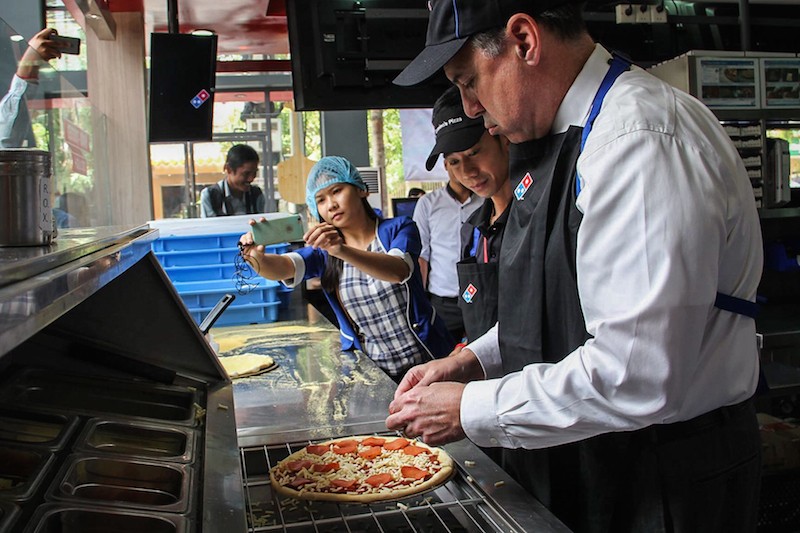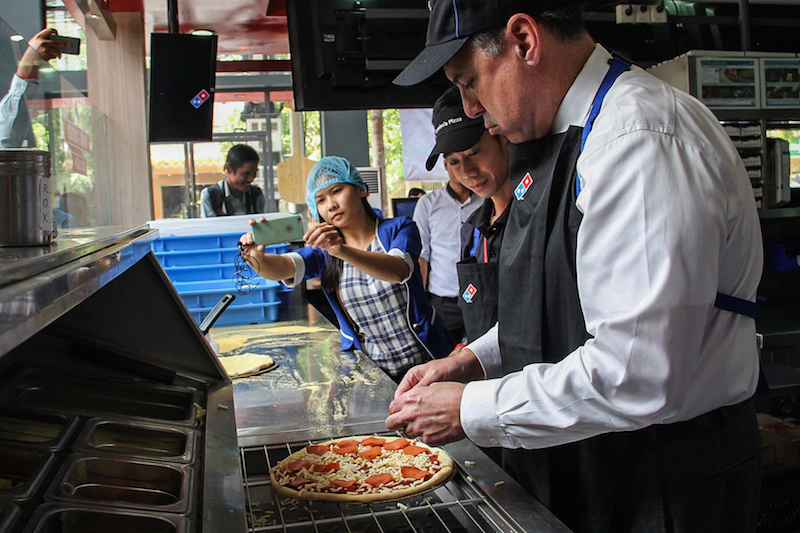On Monday, U.S. Ambassador William Heidt walked through the doors of Domino’s Pizza in Phnom Penh’s gentrified Boeng Keng Kang I commune and was greeted by a semicircle of chanting employees.
In a video uploaded to YouTube by local news website Thmey Thmey, the Cambodian staff clap in time to several rounds of “Have more pizza! Have more fun!” as the ambassador flashes the group a bewildered smile.
Later, the diplomat trades his blazer for an apron and ducks behind the counter, where the employees walk him through the U.S. franchise’s pie-making process and correct his pepperoni placement.
“Voila, there’s my pizza,” Mr. Heidt says in a faux-Italian accent, and the staff erupt into another bout of chanting and clapping as the ambassador emerges from the kitchen.
The cross-cultural episode marked the first day of American Restaurant Week, an event designed to “bring a diverse array of American food to the Cambodian public” through promotions at 20 restaurants in Phnom Penh in the run-up to U.S. Independence Day on July 4, according to the U.S. Embassy.
The event, which features a Japanese-owned Hawaiian restaurant that specializes in hot dogs and a Tex-Mex taqueria run by a Khmer-American couple, captures the fusions that have sprung up as U.S. culinary culture is remade in Cambodia’s rapidly globalizing capital.
And the participating franchises show the scrambled addresses of post-globalization Americana. There’s Swensen’s, an ice cream shop founded in 1948 in San Francisco and now headquartered in Canada, which has only three shops left in the U.S., but dozens scattered across Asia.
Or take recent Phnom Penh entrant Krispy Kreme, a doughnut chain that was born in North Carolina before spreading across the southeastern U.S. and then the globe, but is now set to be acquired by a German investment bank.
At the Street 214 outlet of Minneapolis-based Dairy Queen, 24-year-old supervisor Neak Seiha’s eyes lit up as he recalled the ambassador’s visit to the branch on Monday.
“He learned about the mixed ice cream…[and] the service and communication with the customer,” Mr. Seiha said on Tuesday as hot dogs spun slowly on rollers behind him. “I think he is a good person because he is talking very smooth and he is very kind.”
Mr. Seiha said he was exposed to U.S. gastronomical offerings during visits to an American friend’s house in Phnom Penh.
“When I go to watch football, he always has ice cream, hot dogs and drinks,” Mr. Seiha said. “American food is very good.”
Though Mr. Seiha said his main associations with American food were Dairy Queen’s trademark hot dogs and ice cream, others pushed for a broader definition of the palate.
Will Brown, the American co-owner of restaurant week participants Lone Pine and Taqueria Corona—his Cambodian wife is the other owner—defended the inclusion of a taqueria in the event. Mexican food, he said, has been imported to the U.S., refashioned to American tastes and exported abroad.
In the U.S., “there’s Mexican restaurants in every mall and strip mall,” he said. “Now it’s national and worldwide. There’s Mexican restaurants in London, Paris…everywhere.”
With 40-odd years of experience in the restaurant business in New York and Phnom Penh, Mr. Brown said Lone Pine’s menu reflected a more traditional strain of American food, including its much-loved gumbo.

“I got the recipe from Mr. B’s restaurant [in New Orleans] on the internet,” Mr. Brown said. “People from Louisiana and from New Orleans say that it’s the best gumbo they’ve had outside the country.”
But not everyone is excited about the embassy’s efforts to promote global franchises specializing in milkshakes, fried chicken and double-patty burgers.
“It’s so sad,” said Maurits van Pelt, a Dutch national and director of the NGO-run MoPoTsyo Patient Information Center, when told about the event.
“Traditional Cambodian dishes are more delicious and healthier,” he said, adding that insects—a popular snack in Cambodia—are being hailed as a future source of protein in the West.
“We are replacing the future with the past,” he said.
Embassy spokesman Jay Raman pointed out that the U.S. sponsors nutrition programs at home and abroad, but said the “light-hearted” restaurant week was not the time to dwell on nutritional concerns.
“I would cite my mother’s advice: all things in moderation,” he said in an email.
Back at Domino’s on Tuesday, 17-year-old Hope International School students Brian Kim and Jasper Thor munched meat pizzas topped with a lattice of mayonnaise. Placards on their table advertised a new bacon-potato pizza.
Mr. Kim said he associated American cuisine with “burgers
—big burgers” and said his preference was for “anything with meat on it—[but] not pepperoni. I don’t want pepperoni.”
At another table, 21-year-old Pannasastra University student Kun Rithy said he guessed that Domino’s and its ilk were here to stay.
“The brands from America—[Cambodians] always like,” he said.




